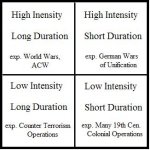swalterh
Corporal
- Joined
- Apr 23, 2012
- Messages
- 433
Some interesting history threads recently, I hope they continue. Everyone has bias and I cannot see why anyone would be upset to see a member in America being Pro American, I am always surprised when they are not :wink2: ^&grin However it is important to note that not agreeing with someone being 'Pro' American' does not make them 'Anti' American.
Some observations so far.
Total War: I prefer the following (Oxford) definition: "a war which is unrestricted in terms of the weapons used, the territory or combatants (including civilians) involved, or the objectives pursued, especially one in which the accepted rules of war are disregarded." Imo a Total War has not yet occured, including, ACW, WWI and WWII, but of course those more personally involved are likely to consider otherwise. Btw I am well aware that Britain did not offically favor the Southern States, but the Northern states were a competitor regarding food imports etc.
Treaties etc:
Hitler was a psychopath and racist to the degree that his beliefs frequently overuled a sound military alternative, but he was not stupid. Hitler felt obligated to declare war on the US because of Germanys treaty with Japan, he did not like the idea.
The ANZUS Treaty does not obligate the United States or Australia to go to war if the other nation does.
Australia is a independent nation, our laws considers Britain to be a foreign power the same as say the United States. For example a person holding dual Australian/British citizenship cannot become a member of the Parliament of Australia. Queen Elizabeth II is a Constitutional (Ceremonial) Monarch of Australia, and cannot dictate government policy/decisions made, including going to war.
Battle for North Africa: I would favor Rommel as being the better and more aggresive battlefield commander, Montgomery being superior regarding logistics and planning. Both were great moral boosters for their time but history has demonstrated that both were also overated, not a surprise considering the amount of propaganda (from all sides).
Matt
You include some very interesting and IMO valid information in this post that has the potential to generate some fun discussions.
Shane


